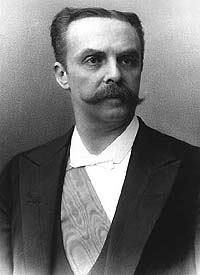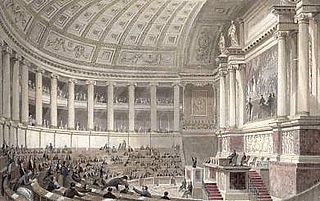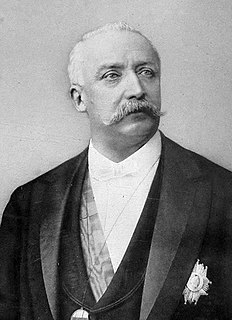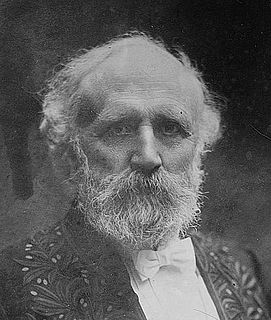
The Popular Front in Spain's Second Republic was an electoral coalition and pact signed in January 1936 by various left-wing political organizations, instigated by Manuel Azaña for the purpose of contesting that year's election. In Catalonia and today's Valencian Community the name of the coalition was Front d'Esquerres.

The July Monarchy was a liberal constitutional monarchy in France under Louis Philippe I, starting with the July Revolution of 1830 and ending with the Revolution of 1848. It marks the end of the Bourbon Restoration (1814–1830). It began with the overthrow of the conservative government of Charles X, the last king of the House of Bourbon.

The Radical-Socialist and Radical Republican Party was a liberal and social-liberal political party in France. It was also often referred to simply as the Radical Party, or to prevent confusion with other French Radical parties as the Parti radical valoisien, abbreviated to Rad, PR, or PRV.

Casimir-Pierre Perier was a prominent French banker, mine owner, political leader and statesman. In business, through his bank in Paris and ownership of the Anzin Coal Co. in the Department of Nord, he contributed significantly to the economic development of France in the early stages of industrialization. In politics, he was a leading liberal member of the Chamber of Deputies throughout the Bourbon Restoration and president of the chamber at the outset of the July Revolution of 1830. He led the liberal-conservative Resistance Party in support of the constitutional monarchy of Louis-Philippe I. He became president of the Council of Ministers and Minister of Interior in the spring of 1831. Although his ministry was brief, his strong government succeeded in restoring order at home and keeping peace abroad. He fell victim to the cholera epidemic in France in 1832.
The 16 May 1877 crisis was a constitutional crisis in the French Third Republic concerning the distribution of power between the President and the legislature. When the royalist President Patrice MacMahon dismissed the Opportunist Republican Prime Minister Jules Simon, the parliament on 16 May 1877 refused to support the new government and was dissolved by the President. New elections resulted in the royalists increasing their seat totals, but nonetheless resulted in a majority for the Republicans. Thus, the interpretation of the 1875 Constitution as a parliamentary system prevailed over a presidential system. The crisis ultimately sealed the defeat of the royalist movement, and was instrumental in creating the conditions of the longevity of the Third Republic.
The Democratic Alliance, originally called Democratic Republican Alliance, was a French political party created in 1901 by followers of Léon Gambetta such as Raymond Poincaré, who would be president of the Council in the 1920s. The party was at first conceived by members of the Radical-Socialist Party tied to the business world who united themselves in May 1901 along with many moderates as gathering centre-left liberals and Opportunist Republicans. However, after World War I and the parliamentary disappearance of monarchists and Bonapartists it quickly became the main centre-right party of the Third Republic. It was part of the National Bloc right-wing coalition which won the elections after the end of the war. The ARD successively took the name Parti Républicain Démocratique and then Parti Républicain Démocratique et Social before becoming again the AD.

Legislative elections were held in Spain on 16 February 1936. At stake were all 473 seats in the unicameral Cortes Generales. The winners of the 1936 elections were the Popular Front, a left-wing coalition of the Spanish Socialist Workers' Party (PSOE), Republican Left (Spain) (IR), Esquerra Republicana de Catalunya (ERC), Republican Union (UR), Communist Party (PCE), Acció Catalana (AC) and other parties. Their coalition commanded a narrow lead over the divided opposition in terms of the popular vote, but a significant lead over the main opposition party, Spanish Confederation of the Autonomous Right (CEDA), in terms of seats. The election had been prompted by a collapse of a government led by Alejandro Lerroux, and his Radical Republican Party. Manuel Azaña would replace Manuel Portela Valladares, caretaker, as prime minister, after what were widely considered fair elections – although limited cases of electoral fraud did occur. They were the last of three legislative elections held during the Spanish Second Republic, coming three years after the 1933 general election which had brought the first of Lerroux's governments to power. The poor result for the political right would help bring about the July coup, and the ensuing civil war. The right-wing military coup initiated by Gens. Sanjurjo and Franco ultimately brought about the end of parliamentary democracy in Spain until the 1977 general election.

The 1902 general election was held on 27 April and 11 May 1902.
The Moderates or Moderate Republicans, pejoratively labeled Opportunist Republicans, were a French political group active in the late 19th century during the Third French Republic. The leaders of the group included Jules Ferry, Jules Grévy, Henri Wallon and René Waldeck-Rousseau.

The Presidential Republic is the period in the History of Chile spanning from the approval of the 1925 Constitution on 18 September 1925, under the government of Arturo Alessandri Palma, to the fall of the Popular Unity government headed by the President Salvador Allende on September 11, 1973. The period spans the same time as the "Development inwards" period in Chilean economic history.
The Radical Governments of Chile were in power during the Presidential Republic from 1938 to 1952.
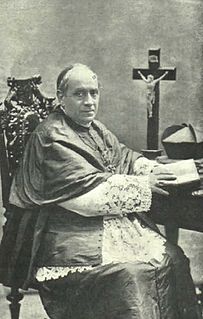
Salvador Casañas y Pagés was a Spanish cardinal of the Roman Catholic Church. He served as Bishop of Barcelona from 1901 until his death, and was elevated to the cardinalate in 1895.
The Progressive Republicans were a parliamentary group in France active during the late 19th century during the French Third Republic.
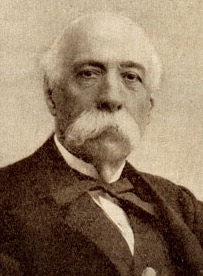
General elections were held in Italy on 26 May 1895, with a second round of voting on 2 June. The "ministerial" left-wing bloc remained the largest in Parliament, winning 334 of the 508 seats.

The Socialist Party is a social-democratic political party in France and was, for decades, the largest party of the French centre-left. The PS used to be one of the two major political parties in the French Fifth Republic, along with the Republicans. The Socialist Party replaced the earlier French Section of the Workers' International (SFIO) in 1969, and is currently led by First Secretary Olivier Faure. The PS is a member of the Party of European Socialists (PES), the Socialist International (SI) and the Progressive Alliance.

The Left in France was represented at the beginning of the 20th century by two main political parties: the Republican, Radical and Radical-Socialist Party and the French Section of the Workers' International (SFIO), created in 1905 as a merger of various Marxist parties. But in 1914, after the assassination of the leader of the SFIO, Jean Jaurès, who had upheld an internationalist and anti-militarist line, the SFIO accepted to join the Union sacrée national front. In the aftermaths of the Russian Revolution and the Spartacist uprising in Germany, the French Left divided itself in reformists and revolutionaries during the 1920 Tours Congress, which saw the majority of the SFIO spin-out to form the French Section of the Communist International (SFIC). The early French Left was often alienated into the Republican movements.
The Resistance Party was a political group during the July Monarchy.

